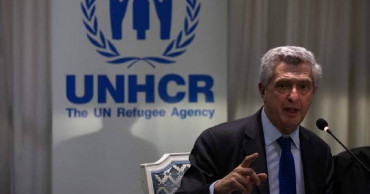refugee crisis
110 million people forcibly displaced as Sudan, Ukraine wars add to world refugee crisis, UN says
Some 110 million people have had to flee their homes because of conflict, persecution, or human rights violations, the U.N. High Commissioner for Refugees says. The war in Sudan, which has displaced nearly 2 million people since April, is but the latest in a long list of crises that has led to the record-breaking figure.
"It's quite an indictment on the state of our world," Filippo Grandi, who leads the U.N. refugee agency, told reporters in Geneva ahead of the publication Wednesday of UNHCR's Global Trends Report for 2022.
Also Read: Record 108.4 mln people forcibly displaced by end of 2022: UNHCR
Last year alone, an additional 19 million people were forcibly displaced including more than 11 million who fled Russia's full-scale invasion of Ukraine in what became the fastest and largest displacement of people since World War II.
"We are constantly confronted with emergencies," Grandi said. Last year the agency recorded 35 emergencies, three to four times more than in previous years. "Very few make your headlines," Grandi added, arguing that the war in Sudan fell off most front pages after Western citizens were evacuated.
Also Read: UN agencies warn of starvation risk in Sudan, Haiti, Burkina Faso and Mali, call for urgent aid
Conflicts in the Democratic Republic of Congo, Ethiopia and Myanmar were also responsible for displacing more than 1 million people within each country in 2022.
The majority of the displaced globally have sought refuge within their nation's borders. One-third of them - 35 million - have fled to other countries, making them refugees, according to the UNHCR report. Most refugees are hosted by low to middle-income countries in Asia and Africa, not rich countries in Europe or North America, Grandi said.
Also Read: Sudan military ruler seeks removal of UN envoy in letter to UN chief, who is 'shocked' by the demand
Turkey currently hosts the most refugees with 3.8 million people, mostly Syrians who fled the civil war, followed by Iran with 3.4 million refugees, mostly Afghans. But there are also 5.7 million Ukrainian refugees scattered across countries in Europe and beyond. The number of stateless people has also risen in 2022 to 4.4 million, according to UNHCR data, but this is believed to be an underestimate.
Also Read: Thousands of exhausted South Sudanese head home, fleeing brutal conflict
Regarding asylum claims, the U.S. was the country to receive the most new applications in 2022 with 730,400 claims. It's also the nation with the largest backlog in its asylum system, Grandi said.
"One of the things that needs to be done is reforming that asylum system so that it becomes more rapid, more efficient," he said.
The United States, Spain and Canada recently announced plans to create asylum processing centers in Latin America with the goal of reducing the number of people who trek their way north to the Mexico-U.S. border.
Also Read: UN: Sudan conflict displaces over 1.3 million, including some 320K to neighboring countries
As the number of asylum-seekers grows, so have the challenges facing them. "We see pushbacks. We see tougher and tougher immigration or refugee admission rules. We see in many countries the criminalization of immigrants and refugees, blaming them for everything that has happened," Grandi said.
Also Read: War in Ukraine, disasters left 71mn people internally displaced in 2022: Report
Last week European leaders renewed financial promises to North African nations in the hopes of stemming migration across the Mediterranean while the British government insists on a so-far failed plan to ship asylum-seekers to Rwanda, something UNHCR is opposed to. But there were also some wins, Grandi said, pointing to what he described as a positive sign in the European Union's negotiations for a new migration and asylum pact, despite criticism from human rights groups.
Also Read: Sudan's government declares UN envoy ‘persona non grata’
Grandi also celebrated the fact that the number of refugees resettled in 2022 doubled to 114,000 from the previous year. But he admitted this was "still a drop in the ocean."
2 years ago
Humanizing refugees
Human civilization has evolved at different paces in multiple and conflicting directions over the course of known history.
Slavery is a thing of the past, yet we intermittently get news of modern-day slavery in sweatshops in different parts of the world. Racism is frowned upon, still, we see examples of rampant racial prejudice even in the most civilized nations of the world. But there is still hope. Thinkers and wise men are continuously pushing the boundaries of conventional thoughts to hasten the process of evolution in the right direction. Hence, we hear concepts like speciesism at a time when we are still fighting a global plague of xenophobia and racism.
The progress from eliminating racism today to a future where speciesism gets mainstream traction is a distant road to be taken for our human race. But this piece is not about the thoughts of the non-conformist philosophers who despise the thought of the human race plundering mother earth and its millions of species sharing the world we live in. This piece is about the major milestones that are far more pressing and long overdue.
One such milestone is creating a world where each human being has the right to belong, right to a state, and right to basic rights irrespective of creed, color, or anything that differentiates one from another. A civilized world cannot bear to see stateless human beings living with the constant fear of persecution. No matter how evolved we are with our technological advancements and refined way of living, if the fruits of our collective achievements are devoid of empathy towards millions who are not given the basic privileges of human existence, we cannot celebrate nor take rest.
This crucial aspect of human evolution needs more attention. As an artist, I lived in my own microcosm like most of us in our little selfish lives. But it all changed when I started working closely with UNHCR, the UN Refugee Agency and started visiting the Rohingya camps in Cox’s Bazar. The continuous interaction with refugees made me realize that the things we take for granted are so coveted by many. Even a selfish human being with a minimum sense of empathy would agree that this global crisis with a very local presence needs more attention.
Read:Myanmar: Hanging activists in a ruined economy
We cannot turn a blind eye to the refugee crisis at home and across the world and accept it as normal. Five years on from the mass exodus of the Rohingya, their displacement in Bangladesh has become protracted. Some 930,000 are living in Bangladesh today. Prolonged exile is unacceptable. We must support them until they can safely return home because all human beings deserve to live full and dignified lives.
UNHCR has confirmed its commitment and called on other humanitarians to deepen the support to the generous Bangladesh government and people hosting the Rohingya. We have moved past the initial emergency phase of this crisis and are working to ensure that refugees are protected and have access to basic services and rights. This includes providing access to education, skills development training and livelihoods, which are also key to prepare them for return so they may rebuild their lives and communities.
Though the host community has been very gracious in accepting refugees, some have not been very congenial, which is normal considering we still live in a world where xenophobia and racism are not something we have been able to eradicate.
We must raise our voices to make sure that exile and marginalization of the Rohingya people do not become normalized. And as time progresses, I’m increasingly convinced that this refugee crisis at home and also globally can only be solved with a concerted effort by world leaders. The solutions are political, and the Rohingya will only be able to return once Myanmar ensures their safety and access to rights. But on a philosophical level, more concerted efforts on educating the next generation about racism and xenophobia are more important. Only then may we have leaders who understand that every single human being has the right to belong, a right to a state, and access to basic rights irrespective of creed, color, or anything that differentiates one from another.
Tahsan Khan is the Goodwill Ambassador of UNHCR in Bangladesh
3 years ago
UN official urges Europe to help Greece manage refugee crisis
Europe should share responsibility and help ease the suffering of thousands of refugees and migrants living in Greece, a senior United Nations refugee official said on Thursday.
6 years ago

.jpg)


